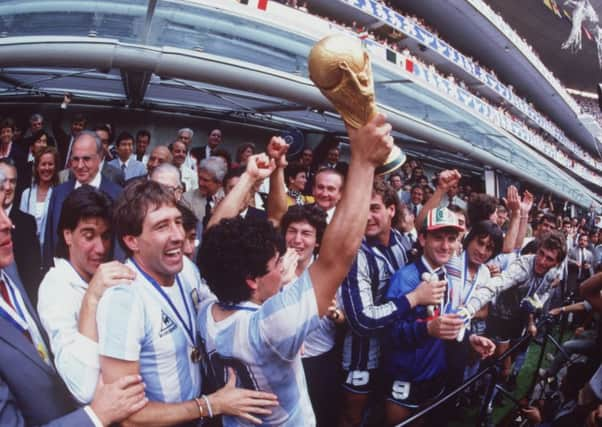Aidan Smith: Bigger isn't better in this grand World vision


But later yesterday morning, as Gianni Infantino’s idea turned into reality, it was obvious the Fifa president didn’t mean groups of three at the qualifying stage – the mechanism by which the Scotland teams of blessed memory reached the finals in 1974 and 1978 – but groups of three at the big party. Getting there for the Scots will almost certainly continue to prove tricky for this Dalglish-less era in our national team’s fortunes.
But will we even want to be there, come 2026? Should we adopt the moral high ground and say, sorry, but, if you’re going to enlarge the World Cup by 50 per cent, we simply don’t want to be part of it?
Advertisement
Hide AdAdvertisement
Hide AdThis is the Infantino concept for the tournament after Qatar, assuming that moving the World Cup into a desert and playing it in winter with the stench of corruption still lingering in the (supposedly) cooled air doesn’t kill it off completely.
In 2026 there will be 48 teams, 16 more than the present format which has been in place since 1998, the year Scotland last qualified.
Traditionalists will snort at this. The finals used to comprise 16 teams – it was 16 in 1970, the all-time classic tournament in Mexico, won by the greatest World Cup goal, scored by Brazil’s Carlos Alberto – and now a whole other 16 countries are going to be added to an event which was already leaving the discerning fan exhausted and bored long before the conclusion.
They have a point.
Big has not meant better recently for the World Cup. The purists will join in the debate here and say that South Africa in 2010 and Brazil in 2014 produced few classic matches, Germany in 2006 fewer still.
Expansionism in football hasn’t worked. The Champions League used to be a competition in which Lyon would threaten and Monaco and Bayer Leverkusen got to the final.
Now it’s an exclusive private members’ club for Real Madrid, Barcelona, Bayern Munich with a transferable semi-final pass to be shared among the other elite teams following a long-drawn-out group phase.
Uefa was able to flog the TV rights last time out for a small fortune but, with armchair fans left increasingly underwhelmed by the early games of little drama or consequence, would struggle to do so again.
The competition urgently needs a revamp.
The Europa League is like the Champions League only worse and happens on Thursdays which used to be a game-free day, cherished by those who think there’s too much football in the world now, and there is.
Advertisement
Hide AdAdvertisement
Hide AdMeanwhile, the European Championships were expanded to 24 teams last summer, enabling a dogged but unexciting Portugal to triumph despite not winning any of their group matches.
You would struggle, though, to find a Welshman or an Irishman – north or south – who didn’t rate the new format of that tournament an outstanding success.
Or indeed an Icelander, and their team’s vanquishing of England is being used as validation for the elephantine World Cup.
The wee guys aren’t just there to make up the numbers; they can pull off shocks and justify their inclusion.
But the World Cup has to decide what it wants to be. Is it a competition for the stellar talents in football or a competition where inclusiveness is uppermost? It cannot be both. Inclusivity is the watchword in many areas of life now, and in a lot of them it’s a good thing. But don’t we want the World Cup, of all tournaments, to be a fiercely-contested affair involving the best of the best?
In any case, you’d struggle to find many remaining deeply suspicious of scandal-hit Fifa who would buy the “inclusivity” argument completely.
Not when a 48-team World Cup is predicted to bring in $1 billion in additional revenue.
The alpine skier from a hot land making its Winter Olympics debut who snow-ploughs gingerly down the slope might be a heart-warming tale in your book; not in mine.
Advertisement
Hide AdAdvertisement
Hide AdI was unmoved by Eddie “the Eagle” Edwards – indeed I found the gushing praise for a man who finished last at ski-jumping, and the national-hero status quickly conferred on him, to be embarrassing. And when it comes to the World Cup I am an unabashed, unreconstructed, old-school snob.
We’re never going to go back to 16, more’s the pity, but Fifa should have stuck with 32.
International football is not going to reclaim ground lost to club football, and appeal to players who view the international breaks as the ideal time for a holiday in Dubai, with a bigger tournament.
And who’s going to stage this bigger World Cup – which countries won’t go broke trying to build the stadia?
Infantino claims the World Cup isn’t inclusive enough.
But that’s what qualification is about and no country is excluded from that. He says he wants to grow the game across the globe but, surely, the appeal, and inspiration, of Pele and Diego Maradona have been universal.
Of course it would be a damned shame if Scotland don’t qualify again but do you really want to see them line up next to Panama, Equatorial Guinea or – jings – Easter Island?